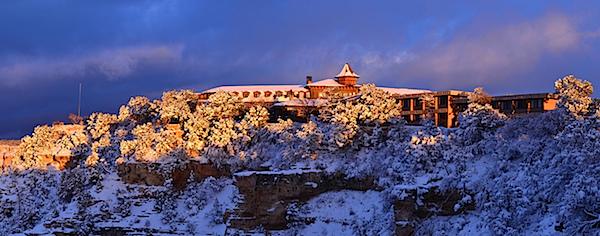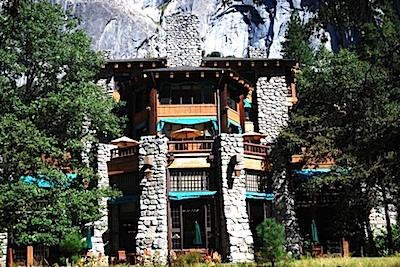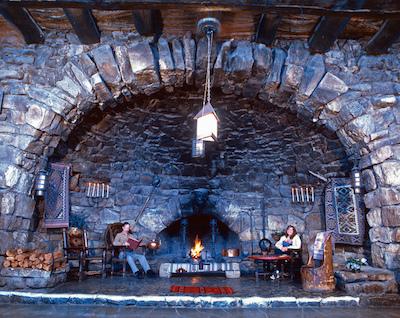
Xanterra Parks & Resorts has filed an application to trademark "El Tovar," and other lodging names on the South Rim of Grand Canyon National Park/NPS photo of El Tovar Hotel
Last fall, Xanterra Parks & Resorts was coming down to its last two months as concessionaire for the lodges and restaurants on the South Rim of Grand Canyon National Park. It had been unable to come to terms with the National Park Service over a new, 15-year pact that would take effect January 1, 2015, and had sued the agency over its contracting decisions. About the same time, Xanterra filed a slew of applications to trademark the names of those iconic lodges and restaurants covered by the contract.
Those applications, currently pending with the U.S. Patent and Trademark Office, come in the wake of news that Delaware North Co. had laid claim to trademarks to place names in Yosemite National Park, including that to The Ahwahnee Hotel, perhaps the grande dame of national park lodging.
Trademarking place names within the National Park System is not new for many products unrelated to the daily operations of a park. Old Faithful isn't just the name of a geyser, it's also tied to a gun. Denali is a national park in Alaska, and it's also a baby stroller and a medical device. Grand Teton National Park towers above Wyoming's western border, and "Grand Teton" is also a cheese and a vodka. But it's the trademarks taken out or applied for, some in recent months, on lodges and places within national parks that perhaps best underscore John Muir's belief that "nothing dollarable is safe."
Muir's full comment -- "Nothing dollarable is safe, however guarded. Thus the Yosemite Park, the beauty glory of California and the Nation, Nature's own mountain wonderland, has been attacked by spoilers ever since it was established, and this strife I suppose, must go on as part of the eternal battle between right and wrong." -- was made in 1908 in the wake of a move by the City of San Francisco to dam the Hetch Hetchy Valley in Yosemite National Park to create a reservoir for its water needs.
Leap ahead 106 years and Muir's fears are ringing loudly as concessions companies lay claim to trademarks for lodges they operate in the park and, at least in one case, place multi-million-dollar numbers to those trademarks if they lose the contract to operate those lodges.
Businesses have been making money off park names and places for decades. General Motors Corp. has taken names of parks -- Acadia and Denali, just to cite two -- and attached them to some of their vehicles. The Ballard Rifle & Cartridge Co. of Powell, Wyoming, received the "Old Faithful" trademark in 2008 for some of its firearms, while the Idaho Candy Co. trademarked some of its confections "Old Faithful" back in 1926.
Software companies have both trademarked park names and, in the case of Apple with its "Yosemite" operating system, simply affixed them to their products.

Delaware North maintains that it owns the trademark to The Ahwahnee Hotel, and won't relinquish it without compensation/Kurt Repanshek
In products unrelated to national parks, the use of park names, whether trademarked or not, might not outwardly pose a serious problem. But in the case of Delaware North Co. at Yosemite, Xanterra Parks & Resorts at Grand Canyon National Park, and the Grand Teton Lodge Co. in Grand Teton, the trademarking of place names and lodges could pose a threat to the historical integrity of the parks as well as a possible impediment to the Park Service's efforts to develop a competitive process for awarding concessions contracts, a process that should be in the best interests of the visiting public.
Delaware North (DNC) had garnered the most attention of late for its trademark claims to The Ahwahnee Hotel, Curry Village, the Wawona Hotel, and Badger Pass. It also received a trademark for "Bracebridge Dinner," a sumptuous year-end, yuletide feast with music and pagentry that has been conducted annually at The Ahwahnee since 1927.
When the Park Service last year prepared a prospectus for companies interested in running concessions in Yosemite, officials for Delaware North notified the agency that DNC had trademarks to various lodges and locations in Yosemite. If it lost the bidding for the 15-year concessions contract that begins in 2016, DNC would require the winning bidder, as part of its Leaseholder Surrender Interest, to pay $51 million for the right to those names. The concessionaire has said that when it acquired the Yosemite Park & Curry Co. in 1993, among the assets it acquired were the intellectual property, ie., the trademarks on place names to the lodges and Badger Pass.
Should the Park Service require that any concessionaire that succeeds Delaware North pay that company $51 million to retain the place names, or should a new concessionaire be given the option to avoid paying that fee by renaming those historic lodges and facilities, and so figuratively erase part of the park's history?
So far the Park Service has not officially recognized Delaware North's claim, but it has in the prospectus left open the door for renaming all the places to which the claim extends if another company wins the contract. As a result, for example, the hotel known since 1927 as "The Ahwahnee" could go by a different name.
At the same time, the Interior Department's Office of the Solicitor is looking into the matter to see if Delaware North can legally trademark those place names, which date back many decades and which Park Service officials consider part of the historical landscape and vernacular of the park.

Xanterra also has applied for a trademark to "Hermit's Rest."/NPS
A search of the U.S. Patent and Trademark Office shows that other concessionaires also have laid claims to names in other national parks. Xanterra Parks & Resorts, which last October announced its intent to sue the Park Service over its concessions contract, that same month filed an application to trademark the name "El Tovar," which is attached to the famous hotel on the South Rim of the canyon. Within two weeks of that application, Xanterra made similar applications to trademark the names of virtually all commercial businesses on, and below, the South Rim: "Phantom Ranch," "Bright Angel Lodge," "Kachina Lodge," "Yavapai Lodge," "Maswick Lodge," "Red Horse Cabin," "Arizona Room," "Lookout Studio," "Buckey O'Neill Cabin," "Thunderbird Lodge," "Trailer Village,""Hopi House," "Hermit's Rest," and "Desert View Watchtower."
All of those applicatons are pending while the patent office reviews them.
Xanterra officials could not be reached Sunday to explain why they applied for the trademarks at a time when they had little more than two months left on their concessions contract, and had not bid on the new pact.
In response to Xanterra's lawsuit, the Park Service argued that Xanterra was trying to thwart competition and that the concessionaire felt that its history on the South Rim entitled it to remain there. While the lawsuit is still pending, the Park Service and Xanterra have come to terms on a temporary one-year contract to allow the company to continue running the concessions while the Park Service works to award the longer term, 15-year contract.
Another park concessionaire, Grand Teton Lodge Co., back in August 2005 received a trademark to "Jenny Lake Lodge," an opulent lodge in the national park. The trademark was renewed in September, according to patent office records.



Comments
But without the concessionaires, the park service wouldn't get a thing.
EC. This from Melville Owen, a San Francisco trademark lawyer, as just quoted in the San Francisco Chronicle. "Owen said the trademark belongs to whomever used it first. Should the debate over the names at Yosemite escalate, the courts will look at when and where the names emerged and track down who had the rights to them and what happened to those rights, he explained." "It will be fascinating to see how this plays out," Owen said. But "it doesn't seem like common sense to allow a concessionaire to own the name of the hotel that it happens to be managing."
Delaware North, and now Xanterra, would like us to believe they are more than "managers." History is clearly on the side that they are only managers and cannot dictate the terms of any sale. They say "the contract" gave them the names. Common sense says the contract gave them nothing of the kind. What "intangibles" might the contract reasonably have included? A furniture design, perhaps, or a unique floor covering of some sort. Or perhaps an 800 reservations number. 1-800-Yosemite. It's yours. But not the names of the park.
You say: "But without the concessionaires, the park service wouldn't get a thing." Obviously, you never met my friend Carsten Lien, both a corporate executive and civil servant. As Carsten reminded me, "No one is indispensable." The bank executive dies; the board meets; and suddenly there is a new executive. Believe me, helpless though We the People may be, we can get along just fine without King George, whether he be called Xanterra, Delaware North, or General Motors. Standing up to arrogance is the American Way.
This is arrogance. I won't call it greed, because greed, as Michael Douglas said in "The Movies," can be a creative force. Its companion meanings are eager and keen. But arrogance, as distinct from confidence, is consistently presumptuous and destructive. Delaware North and Xanterra now "presume" to own our heritage. The parks have no need of that "income," do they? Will not dozens of other corporations be "keen" and "eager" to take their place? Of course they will, and the system allows for that, all the way back to the Yosemite Act of 1864. Here, I think the Park Service acted in good faith--and thought it was dealing with fair-minded people. It didn't spell out every crumb on the table. Shame on those who insist it did.
Please excuse, the thread here is concessions and trademarks, but I found the tax comments interesting. According to the IRS, the top 1% of income earners in 2008 paid 38% of income tax revenue while earning 20% of the income reported. The top 10% paid 70% of income tax revenue while earning 46% of reported income. That left 80% of the population paying the remaining 30% of income tax revenue with 54% of the income reported. Of that 80%, the bottom 50% of population paid 3% of income tax revenue while earning 13% of reported income. Figures like this have not appeared since the the middle 1920s under President Coolidge and his Secretary of the Treasury, Andrew Mellon.
The growing disparity of wealth in the United States is a hot political issue, one which will have to be addressed or will it be postponed until the next crash. A very informative book on the issue is "Capitol in the Twenty First Century" by Thomas Piketty. A tough read, but extremely educational.
I am inclined to agree Alfred, however the DNC post states otherwise. It would help if the Park released a statement, but I suppose this will only happen if litigation actually happens.
I understand the reluctance of agencies to be fully transparent on issues, but I think in the long run it hurts their efforts. The DNC post is quite creditable. The NPS should respond.
Alfred - you didn't answer the question. Did DNC pay for assets - both tangible and intangible when they got the contract? Are they due any value they created there after whether tangible or intangible? Lets establish those core concepts, then we can argue over the value.
As to Mr Owen's opinion, I am not a trademark expert, but it would seem silly to have a trademark office and related bureaucracy if the only criteria was " whomever used it first."
And where have these dozens of companies been for the last 17 months in regards to the Grand Canyon contract? Or better yet, where were they 2 years ago with the Yellowstone contract? Xanterra was the only one to submit a responsive bid for that particular contract.
Sorry, multiple post.
Problem posting.